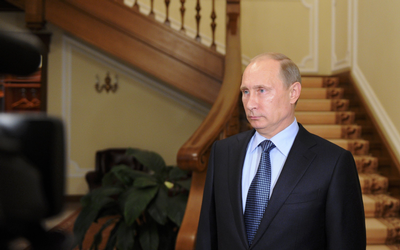Putin hopes to build links with China as West’s sanctions bite
by Stepan Kravchenko and Henry Meyer,
2014-05-20 05:11:41.0
SHANGHAI — China relied on Soviet aid in the eras of Joseph Stalin and Mao Zedong, but has turned the tables as Russian President Vladimir Putin heads to Shanghai.
The Russian leader starts a two-day visit to China on Tuesday, seeking to complete an agreement on natural gas supplies to the world’s second-largest economy, held up for more than a decade because of a debate over the price.
The contract is "nearly finalised," Mr Putin told Chinese media on Monday.
Mr Putin is looking to cement ties with China as the conflict in Ukraine alienates him from the US and its allies.
The relationship with China, Russia’s biggest trading partner after the two-way volume surged sevenfold in the past decade to $94bn last year, is becoming even more important as escalating sanctions threaten to tip the Russian economy into recession.
"As Russia’s relations with the West deteriorate, its ties with China will need to grow stronger," said Dmitri Trenin, director of the Carnegie Moscow Centre.
"Beijing, rather than Moscow, will be the senior power." That role reversal is underscored by the disparity in their economic development in the past 35-years.
In 1979, as Deng Xiaoping started an economic overhaul, China’s output was 40% of the Soviet Russian Republic’s — the present-day Russian Federation, according to a study published this year by the Center for European Reform. By 2010, China’s economy has become four times the size of Russia’s, it said.
Russia’s eagerness to do business with China marks another turn in the tumultuous history of the relationship between the countries — once the leading powers of the communist camp.
Russia and China, two of the five veto-holding nuclear powers in the United Nations Security Council, already co-operate on the world stage, often joining forces to counter what they see as US dominance. They "need each other more than usual" as China is also embroiled in international debates including the conflict over disputed waters of the South China Sea, said Li Lifan, deputy director at the centre of Russia and central Asia studies at the Shanghai Academy of Social Sciences.
As a sign of solidarity, Chinese President Xi Jinping was the guest of honour at the Sochi Winter Olympics in February. US President Barack Obama and most European leaders including German Chancellor Angela Merkel stayed away.
In the escalating standoff over Ukraine, though, China has not taken sides decisively. In March, it abstained in a Security Council vote on a resolution condemning a referendum to endorse the secession of Crimea.
Mr Putin and Mr Xi may leave the sparring over geopolitics aside in their first meeting on Tuesday, which will focus on the gas contract.
The Russian delegation, which includes the heads of OAO Gazprom and OAO Rosneft, the state gas and oil companies, wants to sign a 30-year contract to supply 38-billion cubic metres of gas a year, or 20% of its sales to Europe and pave the way for building its first gas pipeline to China.
Russia opened an oil pipeline to China in 2011, and the government also wants to close a deal to supply 100-million metric tonnes of crude over 10 years. Russian Prime Minister Dmitry Medvedev valued the potential supplies at $85bn.
Bloomberg

Russian President Vladimir Putin. Picture: REUTERS
SHANGHAI — China relied on Soviet aid in the eras of Joseph Stalin and Mao Zedong, but has turned the tables as Russian President Vladimir Putin heads to Shanghai.
The Russian leader starts a two-day visit to China on Tuesday, seeking to complete an agreement on natural gas supplies to the world’s second-largest economy, held up for more than a decade because of a debate over the price.
The contract is "nearly finalised," Mr Putin told Chinese media on Monday.
Mr Putin is looking to cement ties with China as the conflict in Ukraine alienates him from the US and its allies.
The relationship with China, Russia’s biggest trading partner after the two-way volume surged sevenfold in the past decade to $94bn last year, is becoming even more important as escalating sanctions threaten to tip the Russian economy into recession.
"As Russia’s relations with the West deteriorate, its ties with China will need to grow stronger," said Dmitri Trenin, director of the Carnegie Moscow Centre.
"Beijing, rather than Moscow, will be the senior power." That role reversal is underscored by the disparity in their economic development in the past 35-years.
In 1979, as Deng Xiaoping started an economic overhaul, China’s output was 40% of the Soviet Russian Republic’s — the present-day Russian Federation, according to a study published this year by the Center for European Reform. By 2010, China’s economy has become four times the size of Russia’s, it said.
Russia’s eagerness to do business with China marks another turn in the tumultuous history of the relationship between the countries — once the leading powers of the communist camp.
Russia and China, two of the five veto-holding nuclear powers in the United Nations Security Council, already co-operate on the world stage, often joining forces to counter what they see as US dominance. They "need each other more than usual" as China is also embroiled in international debates including the conflict over disputed waters of the South China Sea, said Li Lifan, deputy director at the centre of Russia and central Asia studies at the Shanghai Academy of Social Sciences.
As a sign of solidarity, Chinese President Xi Jinping was the guest of honour at the Sochi Winter Olympics in February. US President Barack Obama and most European leaders including German Chancellor Angela Merkel stayed away.
In the escalating standoff over Ukraine, though, China has not taken sides decisively. In March, it abstained in a Security Council vote on a resolution condemning a referendum to endorse the secession of Crimea.
Mr Putin and Mr Xi may leave the sparring over geopolitics aside in their first meeting on Tuesday, which will focus on the gas contract.
The Russian delegation, which includes the heads of OAO Gazprom and OAO Rosneft, the state gas and oil companies, wants to sign a 30-year contract to supply 38-billion cubic metres of gas a year, or 20% of its sales to Europe and pave the way for building its first gas pipeline to China.
Russia opened an oil pipeline to China in 2011, and the government also wants to close a deal to supply 100-million metric tonnes of crude over 10 years. Russian Prime Minister Dmitry Medvedev valued the potential supplies at $85bn.
Bloomberg




















Change: -0.47%
Change: -0.57%
Change: -1.76%
Change: -0.34%
Change: 0.02%
Data supplied by Profile Data
Change: -1.49%
Change: -0.04%
Change: -0.47%
Change: 0.00%
Change: 0.08%
Data supplied by Profile Data
Change: 0.36%
Change: 0.61%
Change: 0.12%
Change: -0.29%
Change: 0.82%
Data supplied by Profile Data
Change: 0.28%
Change: -0.42%
Change: 0.20%
Change: -1.57%
Change: -0.96%
Data supplied by Profile Data